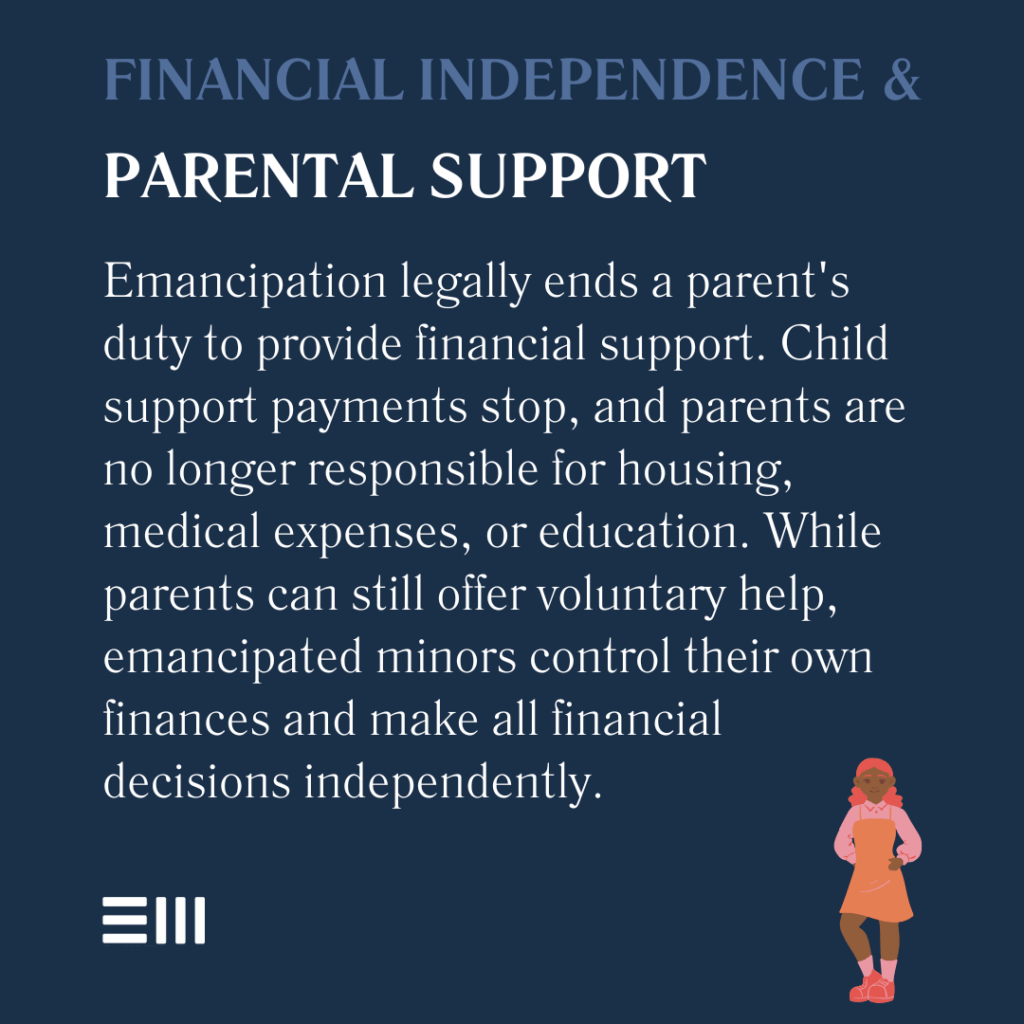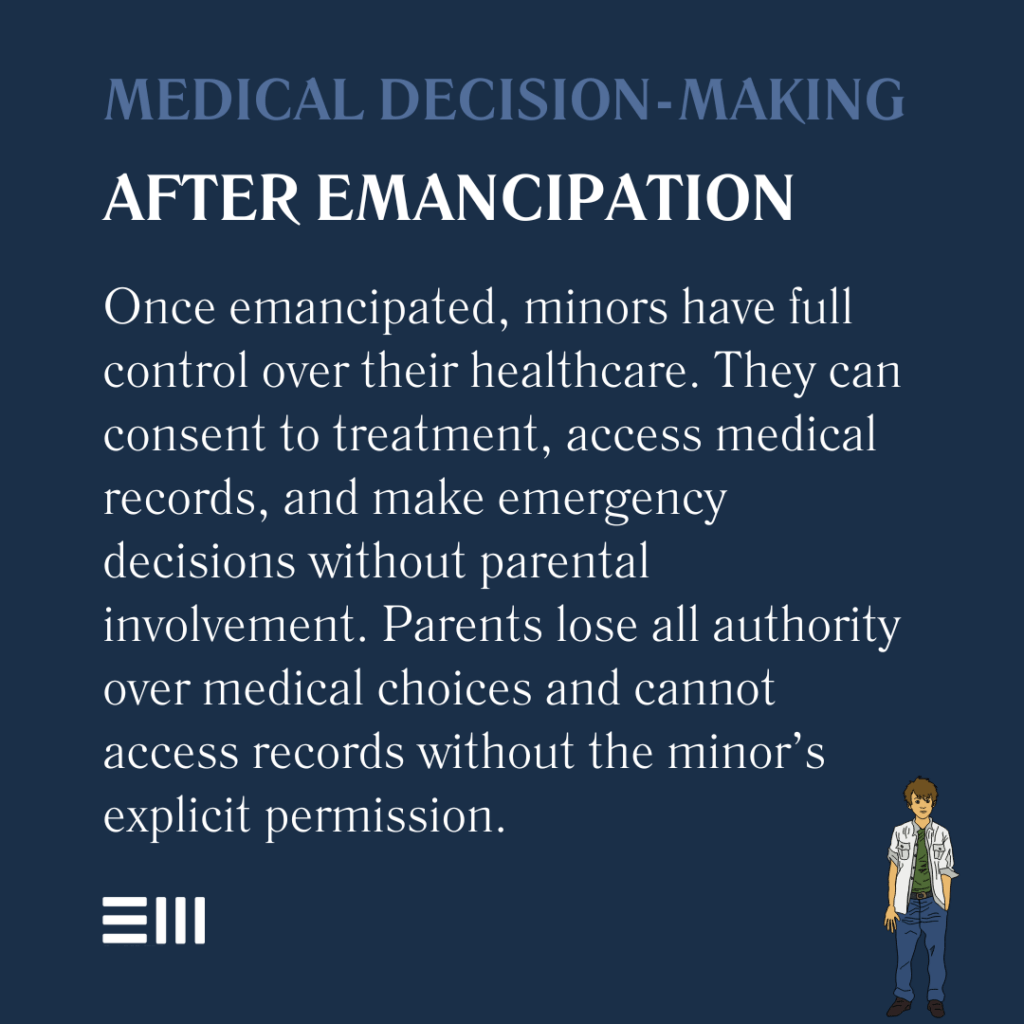
“I think we’ve got to be practical about this. The majority of parents care about their kids, and are not abusing their kids,” stated Alabama Senator Sam Givhan during a recent legislative debate over minors’ rights.
His words echo the tension at the heart of Alabama’s emancipation laws—where the desire to protect parental authority collides with the reality that some minors need legal independence.
When that independence is granted through emancipation, both parents and children enter uncharted legal territory few truly understand.
In February 2025, Alabama legislators debated raising the age of medical consent from 14 to 18, highlighting the state’s ongoing struggle to balance parental rights against minor autonomy.
Against this backdrop, legal emancipation creates a profound shift in the relationship between parents and their children—one that permanently alters rights, responsibilities, and legal obligations on both sides.
The Legal Transformation: Parental Authority After Emancipation
Emancipation fundamentally reshapes the parent-child legal relationship in Alabama. The court decree effectively terminates most parental rights and responsibilities that would normally continue until the child reaches 19, Alabama’s age of majority.
When a minor becomes emancipated in Alabama, parents experience an immediate and significant change in their legal standing. Their authority to make decisions for their child evaporates across nearly all domains of life. This transformation isn’t partial or limited—it represents a complete legal severing of the parent’s decision-making powers over their now-emancipated child.
The Alabama Supreme Court has consistently held that emancipation operates as a legal “termination” of parental authority rather than merely a “modification” of rights.
This distinction matters because it means parents cannot selectively retain certain powers while relinquishing others. The court’s position reflects the view that emancipation represents a minor’s full transition to legal adulthood for most purposes.
This comprehensive termination of authority applies even in cases where parents strongly oppose the emancipation, as Alabama courts prioritize the qualified minor’s rights to independence once the statutory requirements are met. Parents must adjust to this new legal reality regardless of their personal feelings about their child’s readiness for independence.
Financial Support Obligations After Emancipation
One of the most significant changes following emancipation involves the termination of parental financial obligations. Alabama law explicitly relieves parents of support duties once a minor achieves emancipated status.
The financial consequences of emancipation include:
- Immediate termination of child support payments between divorced or separated parents;
- Elimination of legal obligation to provide housing and basic necessities;
- End of responsibility for medical expenses and healthcare coverage;
- Release from duty to fund educational expenses, including college; and
- Protection from liability for most debts incurred by the emancipated minor.
For parents, the financial separation creates a clean break with minimal ongoing economic entanglements.
However, it also means they cannot selectively offer financial support while retaining authority over how their child uses those resources. The emancipated minor gains complete control over their finances, including any voluntary gifts or support offered by former guardians.

Medical Decision-Making Authority: The New Boundaries
Medical decision-making undergoes a complete transformation after emancipation, with parents losing all legal authority to consent to or refuse treatment for their emancipated child.
This shift directly parallels recent legislative debates in Alabama about the appropriate age for medical consent.
Immediately following emancipation, these healthcare-related changes take effect:
- The emancipated minor becomes the sole authorized person to consent to medical treatment;
- Parents lose access to medical records without the emancipated minor’s express permission;
- Healthcare providers must obtain consent only from the emancipated minor for procedures;
- Parents can no longer make emergency medical decisions even if the minor is incapacitated; and
- The emancipated minor gains the right to name their own healthcare power of attorney.
Alabama’s medical community recognizes emancipation as creating a complete break in parental medical authority.
As Huntsville, AL nurse Susan Stewart testified during recent legislative hearings on medical consent laws, “Children living in unstable environments sometimes need to attend services without their parents’ knowledge.” Emancipation creates legal protection for this independence in the healthcare context.

Educational Rights and School Interactions Post-Emancipation
Emancipation significantly alters the parent-school relationship, transferring all educational decision-making authority directly to the emancipated minor. This transformation affects everything from daily school interactions to major educational choices.
The educational changes following emancipation include:
- Transfer of all parental educational rights directly to the emancipated minor;
- Elimination of parental access to educational records without the minor’s consent;
- Removal of parental authority to excuse absences or sign permission forms;
- Shifting of parent-teacher conference rights exclusively to the emancipated minor; and
- Granting the minor complete authority over educational placement and program decisions.
During recent debates over medical consent legislation, former educator Senator Linda Coleman-Madison highlighted how “many of us would be surprised at the conditions our children live under,” emphasizing why some minors need independent decision-making authority.
Emancipation provides this authority in educational settings, allowing the minor to manage their own educational path.
For schools, emancipation requires treating the minor as a legal adult despite their age. This includes accepting the minor’s signature on all school documents and directing all communications about educational matters directly to the emancipated minor rather than their former guardians.
Parents must adapt to having no official standing in their child’s educational journey.
Contractual Rights and Legal Liability Shifts
Emancipation creates a profound shift in contractual capabilities and legal liabilities, with parents released from most legal responsibility for their emancipated child’s actions and agreements.
The contractual and legal changes following emancipation include:
- Emancipated minors gain full capacity to enter binding contracts independently;
- Parents are released from liability for most contracts entered by the emancipated minor;
- Responsibility for the minor’s tortious acts (legal wrongs) transfers solely to the minor;
- Parents lose standing to file lawsuits on behalf of the emancipated minor; and
- The emancipated minor becomes legally responsible for their own debts and obligations.
Alabama courts have consistently held that emancipation effectively transforms the minor’s legal status regarding contracts and liability.
While ordinary minors can void most contracts under the “infancy doctrine,” emancipated minors lose this protection and become fully bound by their contractual commitments.
Residence Decisions and Living Arrangements
Emancipation completely removes parental authority over where and with whom the emancipated minor lives. This represents one of the most immediate and visible changes in the parent-child relationship post-emancipation.
The specific changes to residence authority include:
- Parents lose all legal right to determine where the emancipated minor lives.
- Emancipated minors can establish their own residence without parental permission.
- Parents cannot compel the emancipated minor to return home against their will.
- Housing agreements can be executed solely in the emancipated minor’s name.
- Emancipated minors can choose their own roommates and living companions.
For parents, change means accepting their emancipated child’s complete autonomy regarding living arrangements, even when they strongly disagree with those choices.
The law no longer provides mechanisms for parents to override these decisions once emancipation is granted.
Communication and Relationship Boundaries
While emancipation legally terminates parental authority, it doesn’t necessarily end the human relationship between parents and children.
Many families navigate new boundaries after emancipation that balance legal independence with ongoing emotional connections.
The relationship dynamics that typically emerge post-emancipation include:
- Shift from authority-based interactions to adult-to-adult communications;
- Establishment of new boundaries regarding personal information sharing;
- Development of consent-based rather than obligation-based family involvement;
- Creation of new traditions and interactions that respect the minor’s independence; and
- Negotiation of voluntary family support networks without legal enforcement.
As Senator Robert Stewart noted during debates over medical consent laws, “Children are still human, and they deserve privacy.”
This principle applies powerfully after emancipation, where the formerly strict parent-child relationship transforms into a voluntary association between legally independent individuals.
Frequently Asked Questions About Parental Rights After Emancipation in Alabama
The transformation of parental rights following emancipation generates many questions from both parents and minors navigating this significant legal change.
These common questions address the most frequent concerns about how emancipation affects the parent-child legal relationship.
Can Parents Still Claim Emancipated Minors as Dependents on Taxes?
Generally, no. Emancipation legally severs the dependent relationship between parent and child. IRS rules typically require that the parent provide at least 50% of the child’s support to claim them as a dependent. Since emancipation legally terminates the parent’s support obligation and transfers financial independence to the minor, the tax dependent status usually ends with emancipation.
Do Parents Retain any Legal Authority After Emancipation?
No, parents retain virtually no legal authority over an emancipated minor in Alabama. The court order granting emancipation effectively terminates all parental rights and responsibilities that would normally continue until age 19. Parents cannot selectively maintain certain rights while relinquishing others—emancipation represents a complete legal severance of parental authority.
Can Emancipated Minors Still Inherit From Parents?
Yes, emancipation does not affect inheritance rights. Emancipated minors remain legal heirs to their parents unless specifically disinherited through proper estate planning documents. Emancipation changes the parent’s living obligations to the child but does not alter family relationships for inheritance purposes under Alabama’s intestacy laws.
Start Your New Chapter With Experienced Legal Support
Navigating the complex aftermath of emancipation requires expert guidance to protect everyone’s rights and establish clear boundaries. Our family law attorneys bring decades of experience helping Alabama families understand and adapt to the profound legal changes that emancipation creates.
Whether you’re a parent adjusting to your new legal relationship with an emancipated child or a newly emancipated minor establishing your independence, our team can provide the specific guidance you need to move forward confidently. We’ll help you understand your exact rights and responsibilities in this new chapter.
Contact Baxley Maniscalco today for a confidential consultation about your specific situation. Our compassionate approach and legal expertise ensure you’ll have trusted advocates helping you navigate this significant transition.
Can't find what you're looking for? Search our site below.










